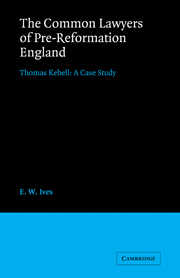Book contents
- Frontmatter
- Contents
- List of figures and tables
- Preface
- Abbreviations
- Manuscript sources
- Table of cases
- Introduction
- PART I THE LEGAL PROFESSION
- PART II LEGAL PRACTICE
- PART III THE LAWYERS AND THE LAW
- 9 The legal system
- 10 The crown and the profession
- 11 The interest of the state
- 12 A changing community
- PART IV THE PROFESSION AND SOCIETY
- Appendices
- Index
11 - The interest of the state
Published online by Cambridge University Press: 05 November 2011
- Frontmatter
- Contents
- List of figures and tables
- Preface
- Abbreviations
- Manuscript sources
- Table of cases
- Introduction
- PART I THE LEGAL PROFESSION
- PART II LEGAL PRACTICE
- PART III THE LAWYERS AND THE LAW
- 9 The legal system
- 10 The crown and the profession
- 11 The interest of the state
- 12 A changing community
- PART IV THE PROFESSION AND SOCIETY
- Appendices
- Index
Summary
Convention has established the years around 1500 as a watershed in English history, when either the strong government of medieval times was recovered, or a qualitative change achieved to a new sort of rule. Whatever the interpretation and whatever dates should be assigned to the process, the fact is clear, and at the heart of it was a determination by the crown to interpret its rights at law in the most liberal fashion and then to enforce them with rigour. Just as social and economic change was beginning to put pressure on accepted legal notions, so the search for strong rule required a reconstruction of the law. Able to rely on the profession and the courts to execute its will within the limits of due process, the crown also turned to the lawyers to reinterpret the law.
The condemnation of Humphrey Stafford involved the striking down of a privilege allowed, perhaps, for six centuries, but the prime example of legal manipulation is the attack by the crown on the greatest of the recent advances in property law, the use. The reason for the hostility of a reinvigorated government is well known. Enfeoffment to uses which gave wide powers to settle estates also had the effect of defeating feudal obligations, notably the right of the lord to wardship of the heir's body, marriage and lands when a minor succeeded to land held in knight service.
- Type
- Chapter
- Information
- The Common Lawyers of Pre-Reformation EnglandThomas Kebell: A Case Study, pp. 247 - 262Publisher: Cambridge University PressPrint publication year: 1983



